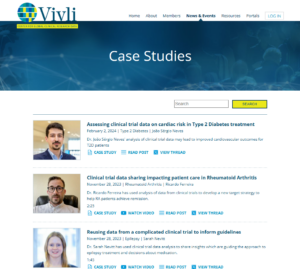Vivli’s Clinical Trials Data Platform and RDCA-DAP Will Make Data More Widely Accessible by Having Specific Data Sets Available on Both Platforms
TUCSON, AZ. — Critical Path Institute (C-Path), the preeminent nonprofit leader in public-private partnerships to accelerate drug development, today announced a strategic data sharing partnership with Vivli, the independent, nonprofit organization committed to the advancement of global clinical trials data sharing. This collaboration signifies an important development in how C-Path’s Rare Disease Cures Accelerator Data and Analytics Platform (RDCA-DAP®) and Vivli work to break silos in data sharing.
The first data sets, a phase II clinical trial in progressive supranuclear palsy (PASSPORT trial, NCT03068468) and two datasets in choroideremia, including a phase III clinical trial (STAR trial, NCT03507686) and a natural history study (NIGHT study, NCT03359551), all from Biogen, will be discoverable and shareable on RDCA-DAP. The harmonized dataset will also be discoverable on Vivli with access managed by RDCA-DAP.
RDCA-DAP, jointly established by C-Path and the National Organization for Rare Disorders with support from the FDA, aims to accelerate the development of treatments for rare diseases through enhanced data sharing and collaboration among key stakeholders, including academic researchers, industry leaders, healthcare organizations, and patient advocacy groups.
“Vivli and RDCA-DAP share a common vision in the urgency to share rare disease data as widely and broadly as possible and we both adhere to the FAIR principles of data sharing,” remarked Alexandre Bétourné, Ph.D., Pharm.D., Executive Director for RDCA-DAP at C-Path. “We are thrilled to announce that Vivli, RDCA-DAP and Biogen collaborated to integrate a Progressive Supranuclear Palsy clinical trial dataset into both partnering platforms, as well as two datasets in choroideremia, our first data in rare eye disorders.”
“The sharing of data between our platform and RDCA-DAP effectively enhances the findability of data for broader access by scientists worldwide,” said Julie Wood, Vivli COO. “Interoperability between data platforms is key to breaking silos in data sharing and we hope this trailblazing effort serves as a model for other initiatives.”
Janet Krause, Associate Director of Data Governance at Biogen, praised the partnership, “It is a privilege to contribute the first rare disease datasets. These datasets can now be analyzed on both Vivli and RDCA-DAP secure environments, to advance science and improve public health.”
“We are beyond excited here at Choroideremia Research Foundation (CRF) by the sharing of this valuable depersonalized data from these Biogen studies to RDCA-DAP. Choroideremia (CHM) is a rare inherited disorder that causes progressive vision loss and ultimately leads to complete blindness,” said H. Eric Hartman, CRF Director of Advocacy. “This data set shared by Biogen includes a 2-year natural history study to characterize the progression of the disease. We are also extremely grateful to all of the CHM participants in these studies. In our view, making these studies available to the platform users is critical as it will become a vital tool in advancing current CHM research both now and in novel approaches in the future. We applaud this impressive collaborative effort by RDCA-DAP and Vivli with Biogen in establishing a global secure platform for CHM data sharing.”
RDCA-DAP plans to work with Vivli to integrate more rare disease datasets from Vivli’s extensive clinical trials data catalogue but also share selected data from RDCA-DAP into the Vivli platform. This collaboration will enhance our collective ability to support innovative research efforts and affirms our dedication to advancing treatments and care for rare diseases through the promotion of cooperative research environments.
C-Path’s partnership with Vivli reinforces RDCA-DAP’s position as a pivotal platform for rare disease data sharing and collaboration, highlighting the critical role of shared data in advancing research and treatment options for rare diseases. its mission to advance rare disease research and treatment development.
About Critical Path Institute
Critical Path Institute (C-Path) is an independent, nonprofit established in 2005 as a public-private partnership, in response to the FDA’s Critical Path Initiative. C-Path’s mission is to lead collaborations that advance better treatments for people worldwide. Globally recognized as a pioneer in accelerating drug development, C-Path has established numerous international consortia, programs and initiatives that currently include more than 1,6
For information on contributing data to RDCA-DAP or exploring collaboration opportunities, visit c-path.org/RDCA-DAP or contact rdcadap@c-path.org. The platform is actively seeking new contributors and partners in00 scientists and representatives from government and regulatory agencies, academia, patient organizations, disease foundations and pharmaceutical and biotech companies. With dedicated team members located throughout the world, C-Path’s global headquarters is in Tucson, Arizona and C-Path’s Europe subsidiary is headquartered in Amsterdam, Netherlands. For more information, visit c-path.org.
Critical Path Institute is supported by the Food and Drug Administration (FDA) of the Department of Health and Human Services (HHS) and is 54% funded by the FDA/HHS, totaling $19,436,549, and 46% funded by non-government source(s), totaling $16,373,368. The contents are those of the author(s) and do not necessarily represent the official views of, nor an endorsement by, FDA/HHS or the U.S. Government.


 Robert Conklin has joined Vivli as the Chief Technology Officer. He has more than 25 years of experience in technology.
Robert Conklin has joined Vivli as the Chief Technology Officer. He has more than 25 years of experience in technology.
 Vivli is delighted to announce the launch of our new
Vivli is delighted to announce the launch of our new 